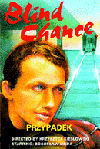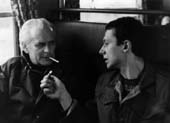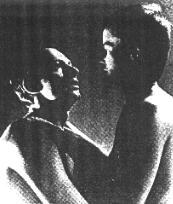Blind Chance
aka Przypadek
|
| |
 |
Polish
language. Poland, 1982. Unrated. 122 minutes.
Cast: Boguslaw Linda, Tadeusz
Lomnicki, Zbigniew Zapasiewicz, Boguslawa
Pawelec, Marzena Trybala, Monika
Gozdzik, Irena Burska, Jacek Borkowski
Writer: Krzysztof Kieslowski
Music: Wojciech Kilar
Cinematographer: Krzysztof Pakulski
Producer: Jacek Szeligowski
Director: Krzysztof Kieslowski
|
| Grade:
A |
Review
by Jeff Vorndam |
 rzysztof
Kieslowski's world is one attuned to coincidence and fate. It appreciates an
energy that connects us to one another–a common bond that transcends environment
and circumstance. His films also deal with the interplay of morality and freedom.
Is freedom the absence of morality, or does morality bolster freedom? In Blind
Chance we are presented with three versions, three possible outcomes, of
one man's life. The conceit is similar to Sliding Doors, but whereas
the recent Gwyneth Paltrow vehicle was content to pacify audiences with generic
romantic comedy platitudes, Kieslowski's film aims for much more interesting
philosophical ground. When it succeeds, Blind Chance is far more rewarding
and even entertaining than Sliding Doors. It's a tragic work of art–one
of those films that tell us about the human condition–but never fear, it's not
too oblique. It is accessible and watchable.
rzysztof
Kieslowski's world is one attuned to coincidence and fate. It appreciates an
energy that connects us to one another–a common bond that transcends environment
and circumstance. His films also deal with the interplay of morality and freedom.
Is freedom the absence of morality, or does morality bolster freedom? In Blind
Chance we are presented with three versions, three possible outcomes, of
one man's life. The conceit is similar to Sliding Doors, but whereas
the recent Gwyneth Paltrow vehicle was content to pacify audiences with generic
romantic comedy platitudes, Kieslowski's film aims for much more interesting
philosophical ground. When it succeeds, Blind Chance is far more rewarding
and even entertaining than Sliding Doors. It's a tragic work of art–one
of those films that tell us about the human condition–but never fear, it's not
too oblique. It is accessible and watchable.
Blind Chance opens with a ten-minute series of seemingly unconnected
scenes. A body is dragged along a hospital floor, smearing a bloody wake. A
young boy says goodbye to his friend who is immigrating to Denmark. An older
lad walks with his girlfriend as someone shouts lewd encouragement from a passing
car. A young male medical student makes eye contact with his classmate who is
physically upset by an autopsy. He asks her why, and she replies that the woman
being autopsied was her elementary school teacher, whom she hated. Lastly, the
same young man answers a phone. It's the hospital. His father has died. His
last words were to tell his son that he is "under no obligations." 
The young man is Witek (Boguslaw Linda), and he is uncertain what to make of
his father's cryptic remark. Is he under no obligation to pursue something that
would please his father, like becoming a doctor? Witek views his father's words
as a grant of freedom–a chance to make of himself what he will. He hurries off
to catch a train to Warsaw, bags in tow, to begin a new life. Here the movie
splits in three.
What if, Kieslowski asks, one moment–the instant of either catching or not
catching a train–were to drastically alter the course of life? The implication
is that all of us encounter many such moments, yet are unaware of it. Think
of how you met your significant other--was it the right place at the right time?
Did you perhaps impulsively decide to go to a party where you met, or did someone
steer you to a Web site where you crossed paths? The role of coincidence is
astounding, and recognizing that can make your choices thrilling. In Blind
Chance, three separate scenarios unfold from Witek's attempts to catch a
train. 
In the first scenario, Witek catches the train by the slimmest of margins.
Once aboard, he befriends a man ho is an official in the Communist Party. As
directionless as Witek is at this moment in his life, he takes up with the man,
and eventually becomes a Party activist. By chance, he re-encounters his first
love, whom he hadn't seen in years. She is antipathetic to the Communist Party,
and Witek struggles to reconcile his love for her with his newfound respect
as a member of the Party. In the second scenario, his run-in with a policeman
lands him in jail, where he hooks up with dissidents on the other side of the
Communist Party. He falls in love with the sister of an old friend (one of the
pleasures of the film is learning who the old friend is). They are separated
when his friend suspects Witek cares more for the girl than for the cause. In
the third scenario, Witek misses the train, but sees a woman he recognizes at
the station. They talk, one thing leads to another, and they marry. Not going
on to Warsaw, Witek re-enters medical school and becomes a doctor.
Despite the three drastically different paths his life takes, Witek is essentially
the same person. His morality is consistent and his behavior in each environment
argues for respect and love for everyone. In each scenario, things go wrong,
and in each scenario Witek is presented witha ticket to France, a symbol of
escape from his duties. Duties should be derived from our morality, Kieslowski
believes. The American political and ethical thought has de-emphasized duties
and set freedom as a polar ideal. The Western ethos does not prescribe moral
obligation; it trumpets individual freedom and isolates that freedom from duty.
Do we have the freedom to do wrong, though? Only so far as it affects no one
but ourselves, the reasoning goes. As Kieslowski shows, actions have an infinite
number of splayed consequences, and it becomes more imperative for us to do
as we should. Blind Chance is highly structured but never feels contrived.
The opening scenes all eventually relate to the stories that unfold. They are
telling moments in Witek's early life that will resonate as he makes decisions
later on. When the film reaches its surprising conclusion, we know it was meant
to be, and that we've just seen a great film.
Review © March
2000 by AboutFilm.Com and the author.
Images © 1981
TOR. All Rights Reserved.



